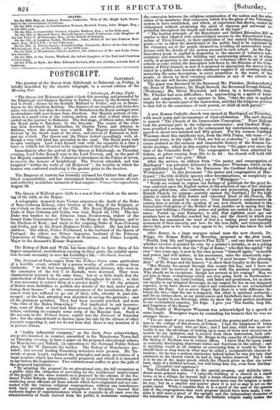A "highly influential company," as the .Daily News acknowledges, about
five hundred in number, assembled in the Manchester Town-hall on Thursday evening, to hear a paper on the proposed educational scheme for Manchester and Salford, (in opposition to the National Public School plan,) by Mr. W. Entwisle the banker. The Bishop of Manchester pre- sided ; and several leading Dissenting ministers were present. Mr. En- twiale at great length explained the principles and main provisions of a local measure which has been actually prepared, and which it is intended to lay before the Legislature. Two extracts must suffice to give the pith of the proposed legislation- " Byy adopting the proposal for an educational rate, the bill recognizes as a publics duty the obligation of providing for the intellectual improvement of the people, in the same manner as is proposed by the scheme of the Na- tional Public Schools Association ; while by its provisions for absorbing and rendering more efficient all those schools which have originated and are con- nected with the various religious congregations, without any interference with their peculiar systems of management or discipline beyond that moderate degree of superintendence which is requisite in all cases over the administration of funds derived from the public, it maintains unimpaired the connexion between the religious organization of the nation and the ode_ cation of its members—that connexion which it is the glory of the Voluntary system to have established, and which, as experience has shown, cannot be endangered without awakening the spirit of vigorous and universal re.. probation throughout the length and breadth of the land." . . , " The leading principle of the Manchester and Salford Education Bill is similar to that adopted with acknowledged success by the Educational Com- mittee of Privy Council, in their application of the annual Parliamentary grant,—viz. to allow the distribution of the public fund to be regulated by the voluntary act of the people themselves, avoiding all unnecessary inter- ference with the details of the system .pursued in each school. As the.Par- liamentary grant is applied in proportion to the amount of voluntary sub:- scriptions and donations for building and maintaining schools, or in other words, in proportion to the amount raised by voluntary effort in aid of such schools as come within the description laid down by the Minutes of the Com- mittee of Privy Council, so now it is proposed to appropriate the money to be raised by a public rate towards the continued support of all existing school& answering the same description, in exact proportion to the wants of the people, as shown by their voluntary attendance at any of the schools to which the rate will become payable." The paper was discussed by the Reverend Mr. Fletcher, (Independent,) the Dean of Manchester, Dr. Hugh Stowell, the Reverend George Osborn, (Wesleyan,) Mr. Oliver Heywood, and others, in a favourable tone. Mr. Fletcher had seen difficulties ; but, approaching in a spirit of kind- ness and compromise, it now appears to him, "that the rate is applied simply for the secular part of the instruction, and that the religious portion is thus left to the conscience of each parent, or child of each parent."


























 Previous page
Previous page